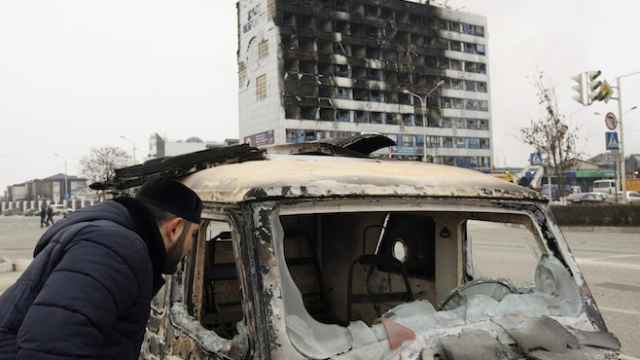A new breed of Caucasus extremists is behind the terrorist strike in the Chechen capital Grozny — and they just may be connected to the terrorist group Islamic State, Russian analysts said Thursday.
The domestic insurgency had a powerful motive for the attack, as it needed to restore clout damaged by its failure to disrupt the Sochi Olympics, said Georgy Engelgardt, an independent expert on Islamic politics.
The plan worked, with the Grozny attack reestablishing the Caucasus insurgency as a still-vibrant Islamist force, experts said.
"They needed to remind the world about themselves — and they pulled it off, albeit at a high cost," said Engelgardt, who pointed out that most attackers were doomed to perish in the heavily policed Grozny.
The Caucasus Emirate terrorist group took credit for the attack, saying it was retribution for Chechen leader Ramzan Kadyrov prohibiting local women from wearing hijab veils (an accusation he earlier denied).
But all experts polled by The Moscow Times said the headwear dispute was just the tip of the iceberg.
"I suspect ties to the Islamic State, even if they have not commented on it so far," said Alexei Malashenko of the Carnegie Moscow Center.
He cited the Islamic State's threats against Kadyrov, the group's wide use of Caucasus recruits, and the similarity of the Grozny attack to Islamic State tactics as proof of this theory.
The North Caucasus insurgency was decimated in a security forces crackdown ahead of February's Sochi Olympics, which the terrorists pledged but failed to disrupt.
Caucasus Emirate leader Doku Umarov was slain in September 2013. Thursday's attack was being credited to his replacement, Aslan Byutukayev.
Hundreds of Caucasus natives have joined the Islamic State in Iraq and Syria, emerging as ruthless veterans capable of massive military action of the kind seen in Grozny on Thursday.
An ethnic Chechen warlord with the Islamic State explicitly threatened in October to "liberate Chechnya." The threat sparked the ire of Kadyrov, who in recent years has pushed out insurgents to neighboring regions with an iron fist.
The nitty-gritty, large-scale violence of the Grozny attack is also a marked departure for the Caucasus Emirate, which favored theatrical statements and token strikes under the previous leadership, Malashenko said.
The Islamic State, however, is not directly encroaching on the Caucasus, experts agreed, saying the global group was either a training ground or simply inspiration for the Caucasus insurgents.
Caucasus natives appeared to have carried out the attack in Grozny — though the bodies need to be identified before it can be determined whether they were Iraq/Syria veterans or domestic fighters, said Sergei Goncharov, a veteran of the KGB/FSB elite strike force Alfa Group.
"In any case, now there is no disputing that militants are still present in Chechnya," Goncharov said.
"The next question is whether this was a one-off slap in the face for Ramzan [Kadyrov], or the start of something bigger," Malashenko said. "We'll soon see."
Contact the author at a.eremenko@imedia.ru
A Message from The Moscow Times:
Dear readers,
We are facing unprecedented challenges. Russia's Prosecutor General's Office has designated The Moscow Times as an "undesirable" organization, criminalizing our work and putting our staff at risk of prosecution. This follows our earlier unjust labeling as a "foreign agent."
These actions are direct attempts to silence independent journalism in Russia. The authorities claim our work "discredits the decisions of the Russian leadership." We see things differently: we strive to provide accurate, unbiased reporting on Russia.
We, the journalists of The Moscow Times, refuse to be silenced. But to continue our work, we need your help.
Your support, no matter how small, makes a world of difference. If you can, please support us monthly starting from just $2. It's quick to set up, and every contribution makes a significant impact.
By supporting The Moscow Times, you're defending open, independent journalism in the face of repression. Thank you for standing with us.
Remind me later.






